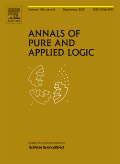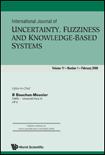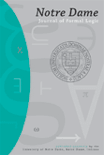
ANNALS OF PURE AND APPLIED LOGIC
metrics 2024
Exploring the Foundations of Logic and Beyond
Introduction
ANNALS OF PURE AND APPLIED LOGIC is a premier academic journal published by Elsevier, specializing in the foundational aspects of logic since its inception in 1974. With a strong commitment to disseminating original research, the journal focuses on both pure and applied logic, making significant contributions to the fields of mathematics and computer science. The journal is recognized for its rigorous peer-review process and is currently ranked Q1 in Logic, reflecting its status among the top-tier publications in the discipline. Researchers will find valuable insights and advancements in logical theory and practice in its pages, while the journal's Scopus ranking further positions it strategically within the mathematical logic community. Although it is not an open-access publication, it offers convenient access options for institutions and subscribers, ensuring a wide reach for groundbreaking findings. The ANNALS OF PURE AND APPLIED LOGIC continues to be an essential resource for professionals, students, and academics alike, facilitating a deeper understanding of logical frameworks and their applications.
Metrics 2024
 0.72
0.72 0.60
0.60 0.60
0.60 51
51Metrics History
Rank 2024
Scopus
IF (Web Of Science)
JCI (Web Of Science)
Quartile History
Similar Journals

Studia Logica
Exploring the Foundations of Logic and PhilosophyStudia Logica is a leading international journal published by Springer that focuses on the intricate interconnections between logic, philosophy, and the history of science. Established in 1953, this journal has garnered an esteemed reputation, consistently appearing in the Q1 category for History and Philosophy of Science and Q2 for Logic in 2023. With a robust Scopus ranking, where it stands at #42 out of 223 in the field of Arts and Humanities and #17 out of 41 in Mathematics (Logic), Studia Logica is pivotal for researchers and scholars keen on exploring the foundations and implications of logical theory and its applications. The journal does not follow an open access model, ensuring that the published work maintains a high standard of quality and rigor. Located in Dordrecht, Netherlands, the journal continues to be a crucial conduit for advancing scholarly discourse and disseminating cutting-edge research in its respective fields.

Computability-The Journal of the Association CiE
Advancing the Frontiers of Computational TheoryComputability - The Journal of the Association CiE, published by IOS PRESS, is a premier academic journal dedicated to advancing the field of computational theory and its applications. Established in 2012, this journal serves a diverse audience, including researchers, professionals, and students involved in the realms of Artificial Intelligence, Computational Theory and Mathematics, and Theoretical Computer Science. With robust categorization in Q2 and Q3 quartiles for various related fields, it provides a vital platform for innovative research and discussions that shape the landscape of computational technologies. Although it operates under a subscription model, the quality of published content ensures significant academic contributions and offers valuable insights relevant to contemporary scientific challenges. Researchers interested in the intersection of computation and its practical implications will find Computability an essential resource for exploring cutting-edge developments and fostering scholarly exchange.

International Journal of Fuzzy Logic and Intelligent Systems
Connecting Researchers to the Pulse of Intelligent SystemsInternational Journal of Fuzzy Logic and Intelligent Systems, ISSN: 1598-2645, is a prestigious journal published by the Korean Institute of Intelligent Systems, dedicated to advancing the fields of Artificial Intelligence, Computational Theory and Mathematics, Computer Science Applications, Logic, and Signal Processing. Established to foster interdisciplinary research, this journal has quickly established its reputation, reaching a respectable Q3 quartile ranking across multiple categories in 2023. It serves as a vital resource for researchers, professionals, and students, offering insights into cutting-edge methodologies and innovative applications of fuzzy logic and intelligent systems. With a focus on disseminating high-quality research, the journal attracts contributions that drive the evolution of intelligent technologies and their practical implications. Published from South Korea, the journal is positioned to impact the global community, facilitating a deeper understanding of intelligent systems in various domains.

TWMS Journal of Pure and Applied Mathematics
Enhancing Visibility of High-Impact Mathematical ResearchWelcome to the TWMS Journal of Pure and Applied Mathematics, a distinguished publication dedicated to advancing the field of mathematics through rigorous research and innovative applications. Published by the esteemed Institute of Applied Mathematics, this journal provides a platform for scholars and practitioners alike to share their findings and insights in both pure and applied mathematical disciplines. With a commitment to quality and integrity, the journal seeks to enhance the visibility and impact of mathematical research, reflected in its scholarly output. Although currently not an Open Access journal, the TWMS Journal aims to feature high-impact articles that contribute to both theoretical understanding and practical implementation. The journal’s address is located at Baku State University, ensuring its roots in a vibrant academic environment in Azerbaijan. As an essential resource in the mathematics community, the TWMS Journal of Pure and Applied Mathematics invites contributions that push the boundaries of knowledge and foster dialogue among researchers, professionals, and students.

Reports on Mathematical Logic
Innovating Ideas at the Intersection of Logic and PhilosophyReports on Mathematical Logic is an esteemed academic journal published by Jagiellonian University’s Theoretical Computer Science Department in Poland. Focusing on the interdisciplinary realms of logic and philosophy, this journal publishes rigorous research articles that explore the foundational aspects and implications of mathematical logic in various contexts. Although it currently maintains an open access model, the journal's impact can be seen through its categorized rankings, with a Q4 in Logic and a commendable Q2 in Philosophy as of 2023. This positions it as a valuable resource for academics seeking to engage with innovative ideas and methodologies in the field. Additionally, the journal has a historical academic presence, having converged in its publication years from 2011 to 2014 and again from 2016 to 2023, underscoring its ongoing commitment to advancing knowledge in logic. With a focus on contemporary research, Reports on Mathematical Logic is essential for researchers, professionals, and students aiming to stay at the forefront of logic studies.

INTERNATIONAL JOURNAL OF UNCERTAINTY FUZZINESS AND KNOWLEDGE-BASED SYSTEMS
Empowering research through the lens of uncertainty and fuzziness.Welcome to the INTERNATIONAL JOURNAL OF UNCERTAINTY FUZZINESS AND KNOWLEDGE-BASED SYSTEMS, a prestigious publication dedicated to advancing the fields of artificial intelligence, control systems engineering, information systems, and software research. Published by WORLD SCIENTIFIC PUBL CO PTE LTD in Singapore, this journal serves as a vital forum for the dissemination of innovative theories, methodologies, and applications rooted in the coexistence of uncertainty and fuzziness within knowledge-based systems. With its ISSN 0218-4885 and E-ISSN 1793-6411, the journal consistently ranks in the Q3 category across various Scopus categories, including Control and Systems Engineering and Information Systems, reflecting its influential position in the academic community. Researchers and practitioners alike will find valuable insights and the latest trends through its comprehensive articles, making this journal an essential resource for those seeking to navigate the complexities of this evolving field.

Algebra and Logic
Exploring the Foundations of Mathematical Thought.Algebra and Logic is a prestigious journal published by Springer, focusing on the intricate fields of algebra, number theory, analysis, and logic. With a history spanning over five decades since its inception in 1968, the journal serves as a critical platform for scholars and practitioners to disseminate cutting-edge research, theoretical advancements, and practical applications within these mathematical domains. Notably, it holds a distinguished Q2 ranking in its categories for 2023, reflecting its impact and relevance in the academic landscape. Though the journal does not currently offer open access options, its rigorous peer-review process ensures the highest standards of scholarly integrity and quality. Additionally, its Scopus rankings further underline its significance, with placements in the competitive percentiles in various subfields. Algebra and Logic is essential reading for anyone involved in mathematical research, providing invaluable insights and fostering dialogue among researchers, professionals, and students alike.

Logica Universalis
Fostering Innovation in Logical Discourse and ApplicationLogica Universalis is an esteemed academic journal published by SPRINGER BASEL AG, dedicated to advancing the fields of Applied Mathematics and Logic. With its ISSN 1661-8297 and E-ISSN 1661-8300, the journal has been active from 2007 and continues to contribute significantly to the discourse surrounding mathematical logic and its applications up to 2024. Located in Basel, Switzerland, Logica Universalis holds a notable position within the academic community, evidenced by its ranking within the Q4 category of both Applied Mathematics and Logic as of 2023. While it currently operates without Open Access options, the journal remains a pivotal resource for researchers and practitioners seeking to explore foundational and applied aspects of logic. Moreover, with a Scopus rank of #22/41 in Logic and #464/635 in Applied Mathematics, it provides a platform for comprehensive knowledge dissemination and facilitates innovative research that bridges theoretical and practical methodologies. This journal is instrumental for anyone looking to deepen their understanding and make meaningful contributions to these intertwined domains.

Moscow University Mathematics Bulletin
Advancing Mathematical Discourse and DiscoveryMoscow University Mathematics Bulletin is a distinguished academic journal published by Springer International Publishing AG, focusing on the dynamic field of mathematics. With an ISSN of 0027-1322 and an E-ISSN of 1934-8444, this journal serves as a platform for innovative research and developments in various mathematics sub-disciplines, making significant contributions to both theoretical and applied mathematics. While it holds a Q3 ranking in the field of Mathematics (miscellaneous) for 2023, this journal remains dedicated to fostering academic discourse among mathematicians. Researchers, professionals, and students will find value in the diverse range of articles that embody rigor and creativity. Although currently not an Open Access publication, the journal provides numerous access options through institutional or personal subscriptions. From its inception in 2007 to its expected continuity until 2024, the Moscow University Mathematics Bulletin is committed to enhancing the understanding and appreciation of mathematical sciences.

Notre Dame Journal of Formal Logic
Fostering Critical Engagement in the Logic CommunityNotre Dame Journal of Formal Logic is a premier academic publication dedicated to the advancement of research in the field of logical studies. Published by DUKE UNIVERSITY PRESS, this journal has been a significant contributor to the discipline since its inception in 1960, with an impressive convergence of scholarly articles expected to continue through 2024. With its focus on rigorous formal logic, the journal plays a crucial role in fostering discussions that bridge mathematics and philosophical inquiry, holding a notable Q2 ranking in the 2023 Logic category. Despite its non-open-access status, the journal reaches a wide audience of researchers, professionals, and students committed to exploring the foundational aspects of logics. Located in Durham, NC, it provides a platform for innovative thought and critical engagement within the logic community. With its impactful contributions, the Notre Dame Journal of Formal Logic stands as a vital resource for those seeking to deepen their understanding of both classic and contemporary logical theories.